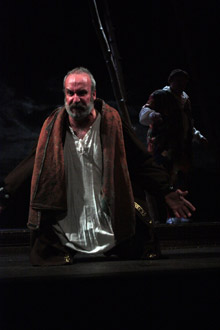
HEARTBREAKING TRAGEDY Monmouth does Lear right. |
Midstage against the roiling charcoal and gray backdrop of the Theater at Monmouth's King Lear is a stand of stark, boughless tree trunks all leaning to one side, as if so long in the same hard wind of Lear's heath that they'll never again grow upright. So, too, has Lear the man long unleashed an often brutal, rash will against those in his family and court, with similar effects on both his daughters and himself. Thus the harrowing inevitability in Shakespeare's most exquisitely written tragedy, in which the aging king falls to myriad treacheries after banishing the one daughter who truly loves him. Monmouth's masterful, devastating production, directed by David Greenham, stars the magnificent Bill Van Horn as the king who sees himself too late.Lear's vanity, his quickness to rage, and his bullying ways are not just searingly portrayed in Van Horn's hands, but also deftly shown for what they truly are: Long-honed defenses against the fragility of his own ego. In Lear's eyes, searching and easily distracted, Van Horn shows how desperately the king needs to hear his court (arrayed in Helen Smith's medieval jewel tones, carrying crests) laugh at his own wit, needs to appear to understand the jokes of his dangerously wise fool (Dennis Price, beautifully balancing comedy and foreboding), needs to be the one laughing loudest and last.
It's when this propped-up persona is threatened that he turns to shoves and impulsive cruelties, a behavior that has surely had a hand in the duplicity of his viper elder daughters, Goneril (Denise Poirier, with silvery, mellifluous rancor) and Regan (Jeri Pitcher, coy, savvy, and cold). Perhaps his m.o. is also responsible for the hardness present even in the youngest and truest daughter, Cordelia (the clarion Jeanne Joe Perrone), whose abrupt, exasperated manner suggests that this isn't her first run-in with her father's out-sized vanity. Indeed, everyone seems to be familiar with the king's foibles but the king himself: Easily his greatest flaw is that, as one daughter says, "he has ever but slenderly known himself."
He does start to see some glints of his horrible mistakes, as early as the first, pivotal scene: Helpless to his own wrath, he banishes Cordelia and then his loyal subject the Earl of Kent (the excellent David Marcotte). Lear's court, in a nice bit of blocking, remains stationary throughout all this in an arc behind him, reacting not with dramatic movements, but with increasingly distressed eyes and tautened hands. Then, for a fleeting moment, watching Kent go, Lear's eyes reveal a shaken man, one who already has profound doubts about what he's set in motion.
It gets much, much worse, of course, for everybody. Those with old grievances or ambitions turn against kin — Goneril and Regan emasculate Lear and scheme against each other; Edmund (Jared Michael Delaney), bastard son of the Earl of Gloucester (Mark S. Cartier) and long slighted for his illegitimacy, wrongs both his father and half-brother Edgar (Dustin Tucker). It all leads to violent, primal battles, poisonings, duels, and back-stabbings (often enacted with very fine stage fighting). One man goes mad on the heath and smears his half-naked body with earth. Another is hanged by a mob. A third is bloodily blinded in one eye by a man's boot and by a woman's finger in the other. These deeds, played out with classical realism on Monmouth's stage, are genuinely chilling, horrors to feel in the spine.